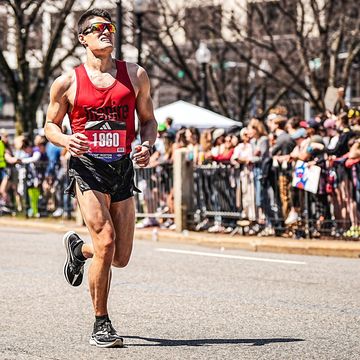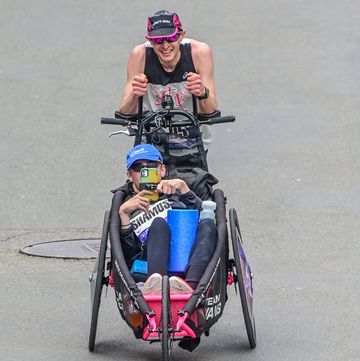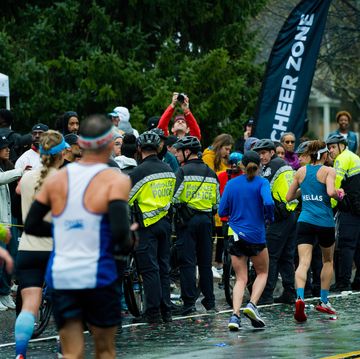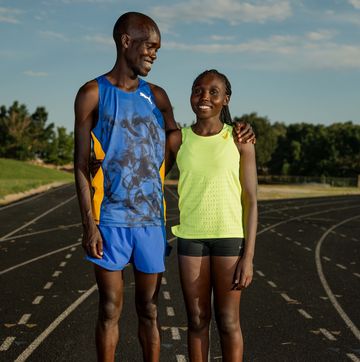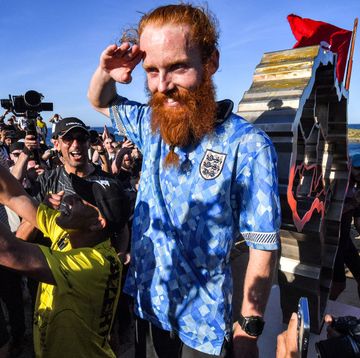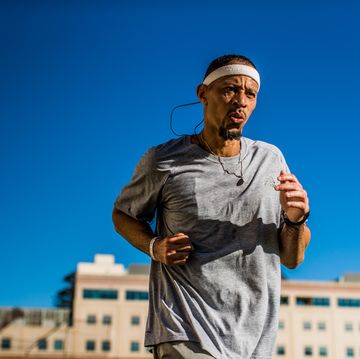In December of 2009, Lionel Sanders asked his parents for money. They balked. They didn’t trust their son because the last time they loaned him cash was on a loaded debit card, meant for food while he attended college in Ontario, Canada. Sanders used it to buy cocaine.
Sanders was 21 at the time—gaunt with pale skin. He’d lost 40 pounds since starting college in 2006. He was a recluse and a drug addict—going outside once a week, early in the morning, to get groceries.
But when he approached his parents for their credit card that winter, his request for money wasn't intended for drugs. He needed it for a registration fee.
Sanders began to turn his life around. The way he decided to do it? Finish an Ironman.
This weekend in Kona, Hawaii, Sanders—now 27—has a realistic chance to nab a podium spot at the Ironman World Championship. He’s one of Canada’s top professional triathletes, with his resume including a first-place finish at the 2015 Galveston 70.3 and fourth at the 2015 Texas Ironman. He’s been clean for nearly five years.
“I am a true believer that you can do anything,” Sanders told Runner’s World. “If you want it enough, you have the mental strength to persevere.”
There’s irony in that statement, because Sanders used to only want drugs.
“After I tried cocaine for the first time, I went pretty hard-core and I started to lose my sanity,” he said. “I had an experience where, I don’t really know what happened, but basically I went crazy and tried to jump out of a window onto a freeway.”
Sanders started running in the third grade. He was a competitive cross-country runner in high school, and he even tried out for his college team at the University of Windsor. “I didn’t make the team, but it didn’t matter,” he said. “That was really when I started to go much harder into the partying lifestyle.”
He quit running for more than four years, living his life from one high to the next. But by late 2009, he was ready to escape his drug habit.
Sanders said he decided to stay sober at a party one night as he watched his friends argue over the last line of cocaine. “That was the first time I saw what I was doing and who I was becoming,” he said.
On November 5, 2009, Sanders decided to go for a run near his basement apartment. He took a route through a graveyard. He said seeing the tombstones was a “transcendent experience,” and he realized running could help save his life. Two weeks later, he ran a 10K with his mom, Becky. A month later, he convinced her to pay for the registration fee of the 2010 Louisville Ironman.
“I researched what an Ironman was and saw that it takes discipline and motivation. Everything I didn’t have back then,” he said.
Sanders’s recovery wasn’t smooth. He's relapsed three times and considered suicide. But he found purpose and motivation while training.
And it turns out, despite years abusing his body, he was still fast. He finished the 2010 Louisville Ironman in 10:14:31.
“The first words out of my mouth were, ‘That was the stupidest thing I have ever done, and I am never doing that again,’” Sanders said. “My parents had to help me get back to the hotel room. I had a pizza and I realized how amazing that was and how hard that was. But I still finished.”
He trained for three years, but Sanders didn’t know he was good enough to become elite until 2013 when he won the Muskoka Ironman 70.3 in Muskoka, Ontario. He turned pro after that race and followed that performance with dozens of podium finishes at triathlons and running races in Canada and the U.S.
Sanders has been in Kona for a week to get acclimated to the heat for his first Ironman World Championship. He wants to win this weekend.
“Absolutely, this is the pinnacle of the sport and I want to be known as the best,” he said.
He claims to have an advantage. He said the personality trait that almost killed him, the one that made him crave cocaine and do whatever it takes to get high, is the same one that makes him a competitive triathlete.
“This is my theory that you can observe in people,” he said. “What makes you successful tends to be your Achilles heel. For me, when I do something I do it hard-core. I focus on it. I want to excel at it. I put everything I have into something.
“In some twisted way that’s what made me successful in using drugs and alcohol. I was hard-core into it. I could outlast anyone in partying. I have learned to accept that trait of mine.”
But that trait no longer gets him high. It no longer is trying to kill him. Instead, it could get him on the podium in Kona.
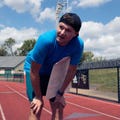
Kit has been a health, fitness, and running journalist for the past five years. His work has taken him across the country, from Hayward Field in Eugene, Oregon, to cover the 2016 Olympic Trials to the top of Mt. Katahdin in Maine to cover Scott Jurek’s record-breaking Appalachian Trail thru-hike in 2015.




